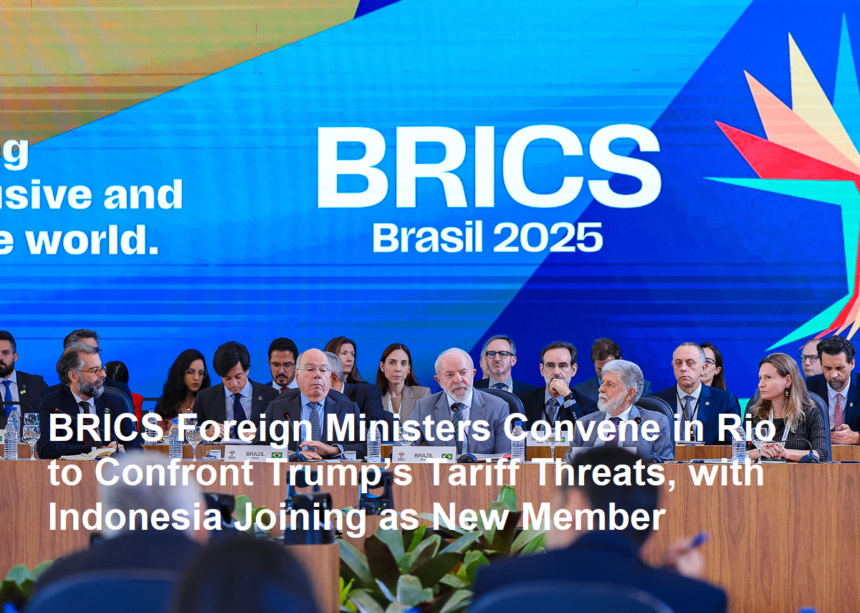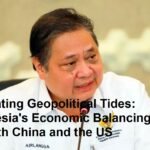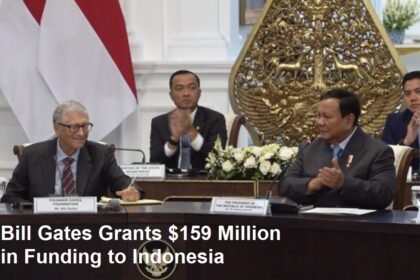Rio de Janeiro, April 28, 2025 – Foreign ministers from the expanded BRICS bloc met in Rio de Janeiro this week to coordinate a united response to recent U.S. tariff measures and to signal their determination to defend multilateral trade norms. Under Brazil’s 2025 BRICS presidency, delegations from the original five members—Brazil, Russia, India, China, and South Africa—were joined by six newcomers, including Indonesia, Egypt, Saudi Arabia, the UAE, Ethiopia, and Iran, for the two-day gathering.
The summit was precipitated by a raft of trade actions announced by President Donald Trump over the past months. In January, Washington imposed punitive duties of up to 145 percent on certain Chinese exports, before warning that any BRICS initiative to reduce reliance on the U.S. dollar could trigger further levies. “There is no chance that BRICS will replace the U.S. dollar in international trade, or anywhere else, and any country that tries should say hello to tariffs, and goodbye to America!” Trump declared on his Truth Social platform.
Meeting at the Itamaraty Palace, BRICS ministers discussed the formulation of a joint communiqué sharply criticizing unilateral trade restrictions while stopping short of direct confrontation. Chinese Foreign Minister Wang Yi pressed for language that would “unequivocally condemn protectionism,” whereas Brazil’s Celso Amorim—counsel to President Lula da Silva on foreign affairs—urged a more measured approach, mindful of maintaining dialogue with the United States.
Indonesia, which formally acceded as the bloc’s tenth full member earlier this year, made its inaugural appearance at the ministerial level. Foreign Minister Sugiono emphasized Jakarta’s commitment to “strengthening South-South cooperation” and to “upholding the principles of open, rules-based trade”—a clear rebuttal to Trump’s America First tariff policies. “We believe collective action, not coercive measures, is the best path to sustainable economic growth for all,” he stated at a press briefing on the summit’s sidelines.
Beyond trade, delegates also addressed the critical issue of climate finance. With the UN climate summit scheduled to take place in Brazil later this year, BRICS ministers pledged to flesh out proposals for scaling up green energy funding in emerging economies, arguing that wealthier nations must bear a larger share of the transition costs.
Russia’s Foreign Minister Sergey Lavrov framed the Tariff threats as symptomatic of a broader shift toward unilateralism in Washington. “When one partner uses its economic might as a weapon,” Lavrov warned, “it imperils the very foundations of international cooperation that have underpinned global prosperity for decades.”
South Africa’s Naledi Pandor, meanwhile, highlighted the potential ripple effects on developing-country supply chains, cautioning that retaliatory measures could disrupt food and commodity exports critical to many economies across Africa and Asia. “Our shared priority must be to preserve market access and investment flows for the most vulnerable,” she argued.
At the conclusion of the Rio meeting, ministers agreed to circulate a draft joint statement to their capitals by early May. The final communique is expected to reaffirm each country’s sovereignty over monetary and trade policy while urging the United States to return to multilateral negotiation forums such as the World Trade Organization.
Looking ahead, attention will shift to the full BRICS summit set for July in Salvador, Bahia, where heads of state will weigh the ministerial recommendations and potentially endorse a broader action plan. For Indonesia, the momentum in Rio marks a significant diplomatic milestone, underscoring Jakarta’s rising profile in global economic governance—and its readiness to stand alongside other emerging powers in contesting unilateral trade coercion.









